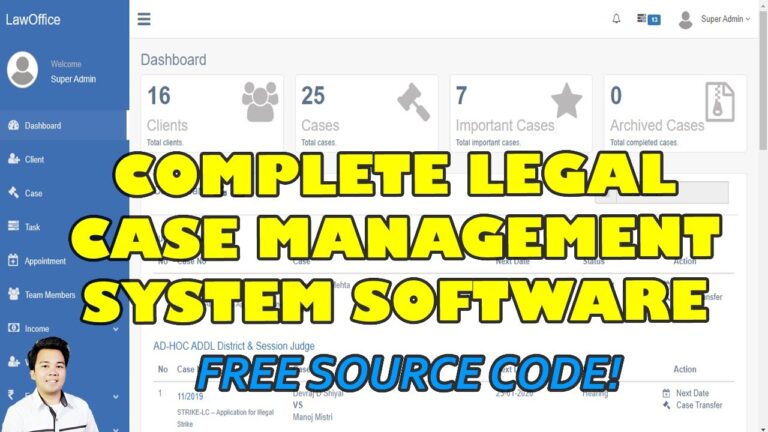Complete Legal Case Management System Software in PHP

Legal Case Management System Software in PHP MySQL Free Download is the digital ways which keeps everything organized and easily accessible way. Our feature law office has all the value added features that an advocate always look forward to meet his/her expectation to simplify law practice.
Creating a complete Legal Case Management System Software in PHP involves designing and implementing a system to manage legal cases, clients, documents, schedules, and billing. Below is a step-by-step guide to help you build this system:
1. Database Design:
- Design your MySQL database schema to store information about cases, clients, documents, schedules, users, and billing.
- Create tables for
cases,clients,documents,schedules,users,billing, and establish relationships between them (e.g., a case has multiple documents, a client has multiple cases, etc.).
2. Setting Up the Development Environment:
- Set up a local development environment with PHP and MySQL, using tools like XAMPP or MAMP.
- Create a new database and import your database schema using SQL scripts.
3. User Authentication:
- Implement user authentication functionality to allow lawyers, paralegals, and staff to log in securely.
- Use PHP sessions or JSON Web Tokens (JWT) for user authentication and authorization.
4. Case Management:
- Develop functionality for creating, editing, and managing legal cases, including case details, parties involved, case status, etc.
- Implement features for assigning cases to specific lawyers or teams and tracking case progress.
5. Client Management:
- Implement features for managing client records, including adding, editing, and deleting client profiles.
- Associate clients with specific cases and track client interactions and communications.
6. Document Management:
- Develop functionality for uploading, organizing, and managing case-related documents, including pleadings, contracts, evidence, etc.
- Provide version control and access control features to manage document revisions and permissions.
7. Schedule Management:
- Implement features for scheduling appointments, court dates, deadlines, and tasks related to legal cases.
- Provide calendar views, reminders, and notifications to keep users informed and organized.
8. Billing and Invoicing:
- Develop functionality for tracking billable hours, expenses, and fees associated with legal cases.
- Generate invoices and billing statements for clients, with options for customization and integration with accounting software.
9. Reporting and Analytics:
- Develop reporting tools to generate summary reports and analytics on case status, billable hours, revenue, etc.
- Generate dynamic reports using PHP and MySQL queries, and display them in tabular or graphical formats.
10. Testing and Debugging:
- Thoroughly test each feature of your legal case management system to ensure it works as expected. Pay attention to edge cases and error handling scenarios.
- Use tools like PHPUnit for automated testing and debugging tools like Xdebug for troubleshooting.
11. Deployment:
- Deploy your legal case management system to a live web server, ensuring it meets the necessary requirements for PHP and MySQL.
- Secure your application by implementing measures such as HTTPS encryption, input validation, and SQL injection prevention.
By following these steps and considering these tips, you can develop a comprehensive Legal Case Management System Software in PHP that meets the needs of law firms, legal departments, and practitioners.
Server Requirements
- PHP >= 7.2.0
- BCMath PHP Extension
- Ctype PHP Extension
- JSON PHP Extension
- Mbstring PHP Extension
- OpenSSL PHP Extension
- PDO PHP Extension
- Tokenizer PHP Extension
- XML PHP Extension
Project Demonstration
Login as Admin
Email: [email protected]
Password: 12345678Ab@





